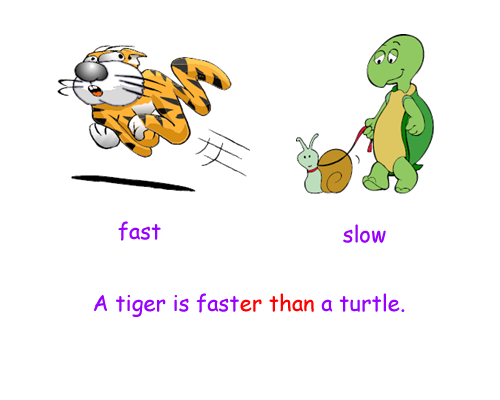Ingles II
Block I " What makes me specia?"💜💛
Students can
- Identify and compare physical characteristics.
- Practice making decisions.
- Recommend places based in their qualities.
- Describe everyday objects.
Grammar
- Comparative adjectives.
- Comparative as...as
- Suprlatives
- Comparative and superlative adjectives.
Comparative adjectives
One way to describe nouns (people, objects, animals, etc.) is by comparing them to something else. When comparing two things, you’re likely to use adjectives like smaller, bigger, taller, more interesting, and less expensive. Notice the ‑er ending, and the words more and less. A mistake that both native speakers and non-native speakers make is using incorrectly formed comparative adjectives. See the sentences below for an illustration of this common error:
Incorrect His cat is more large than my dog.
Correct His cat is larger than my dog.
So what makes the first example wrong and the second right? There are a few rules that explain this:
For adjectives that are just one syllable, add -er to the end (this explains the above example).
For two-syllable adjectives not ending in -y and for all three-or-more-syllable adjectives, use the form “more + adjective.”
For two-syllable adjectives ending in -y, change the -y to -i and add -er.
These simple rules make it easy to tell when you should add -er or -ier and when you should use “more + adjective.”
Here are a few more examples:

Correct This house is more exciting than ever.
Incorrect This house is excitinger than ever.
Correct Mike is funnier than Isaac.
Incorrect Mike is more funny than Isaac.
Notice the spelling change for adjectives ending in ‑y: the comparative ends in ‑ier.
Incorrect This book is boringer than the last one.
Correct This book is more boring than the last one.
Incorrect Advertising pressures women to be more thin .
Correct Advertising pressures women to be thinner .
Coparative as...as
We use as + adjective/adverb + as to make comparisons when the things we are comparing are equal in some way:
- The world’s biggest bull is as big as a small elephant.
- The weather this summer is as bad as last year. It hasn’t stopped raining for weeks.
- You have to unwrap it as carefully as you can. It’s quite fragile.
- We use not as … as to make comparisons between things which aren’t equal:
- It’s not as heavy as I thought it would be, actually.
- She’s not singing as loudly as she can.
- They didn’t play as well as they usually do.
We can modify not as … as by using not quite as or not nearly as:
The second race was not quite as easy as the first one. (The second race was easy but the first one was easier.)
These new shoes are not nearly as comfortable as my old ones. (My old shoes are a lot more comfortable than these new shoes.)
We can also use not so … as. Not so … as is less common than not as … as:
The cycling was good but not so hard as the cross country skiing we did.
Superlatives
We use a superlative to say that a thing or person is the most of a group. When we use a superlative adjective ('the tallest student') before the noun, we generally use it with 'the'. This is because there's only one (or one group) of the thing we are talking about. There is one student who is the tallest in the class, and because it's clear to the listener which one we mean, we usually use 'the':
- She's the most beautiful girl I've ever seen.
- It's the best café in London.
- John and Lisa are the most intelligent students here.
- This bowl is the biggest one.
Remember, we don't use 'the' when there is a possessive:
- He's my best student.
- That's our most important goal.
It's possible to drop 'the' when the adjective is used later in the sentence, rather than directly before the noun. We can choose either 'the' or 'no article', with no change in meaning:
- She is (the) most beautiful.
- This café is (the) best.
- John and Lisa are (the) most intelligent.
- This bowl is (the) biggest.
Referencias
- Burkholder A.( 2018). Cambridge for DGB. Mexico city: Cambridge Univesity Press
- Curso de ingles.(2018).Comparatives and superlatives. Recuperado el 10 de febrero del 2019 de https://www.curso-ingles.com

Comentarios
Publicar un comentario